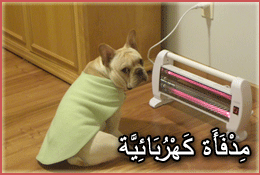Beginner - Electric heater

Now that the winter is here, many people rush to buy electric heaters, and it does get cold in some Arab countries. Tune in to learn how to buy one to keep you warm and comfy in the cold winter times.


|
ayaz says

Tue 1st Jan 13@01:55 pm
Happy new year to all
|
|
Happy new year!!
|
|
كل غلم وأنتم بخيلل
I wish you all more joy of learning together! |
|
كل عام وأنتم بخير
Every year and you are all well Best wishes from us at ArabicPod |
|
شكراياأستاد
Now let me say again'كل عام وأنتم بخير' Oh well,terrible misspelling!  But anyway,I have 2 questions. As for the second line,is it possible to explain the same situation using'faqad'? Like:We only have gas heaters. The other one is very different,but for me this dialogue sounds like that the customer is more polite than the clerk!Is this a normal behavior? I found it very amusing. 
|
|
Yes Kurumi, it is possible to say (We only have gas heaters), simply use: (لدينا فقط مدافئ غاز).
As for your note on the customer and the shopkeeper, we probably should have added (sorry -آسف) before the shopkeeper answer, this would make it sound as polite as the customer. |
|
@Ehab
Shukran jazeeran for the explanation. Adding aasef sounds natural for sure. I thought 'we have'was '3ndinaa',but now I could know ladaynaa can be used as well.^^ In the podcast,your talking about the weather in Arabic countries was really interesting to me.Those little informations are useful to know more about them. |
|
آسف،لكّنّّي مع سؤال واحدة
(Is it possible to say this way?) 'yoojad'is used in this lesson and this is fourth one I came across(The other three lessons are :There is no soap,A wish and No phone line.) I thought it would be toojad. Would you explain why it is yoojad a bit more,please? Is midfa2ah a feminine noun and madaafi2 a plural form? 
|
|
@Kurumi, first let's agree that (question - سؤال) is a masculine word, so you always say (سؤال واحد) using the masculine form of (one) which is (واحد). Make sure you record this in your head that way so you don't need to think of it before you say it (سؤال واحد).
About (yoojad), the rule is, if it comes before a feminine noun then you can use the masculine or the feminine forms of it, so both examples below are correct: يوجد سيارة في الكراج توجد سيارة في الكراج Notice we have (سيارة) which is feminine, and yet we used (يوجد) because it came BEFORE the feminine noun (سيارة). If the noun is masculine then you have to use only the masculine form (يوجد). Now if the noun comes first then you have to match the gender, so (يوجد) goes with masculine nouns and (توجد) goes with feminine nouns, examples: السيارة توجد في الكراج الكتاب يوجد في المكتبة Hope you got enough detailed answer  We probably should do a lesson about it actually. We probably should do a lesson about it actually.
|
|
@Ehab
شكرآ لهذا التفسير سريع Now I think I understand clearly. So,let's say,when we choose and follow a leader,men are more stubborn than women,but when we go to the front,both women and men need to make a clear decision!  Also I'll keep on practicing until I can feel the sense of matching the gender.Hope I can improve my wriring skill very soon,I can't find any delete key here,that means my misspellngs will be left here forever.. 
|
|
This noun matching rule was already explained in a podcast. I think it came out in the summer, but I don't remember exactly. Perhaps a digression in that podcast, but I found it interesting and worthwhile.
|